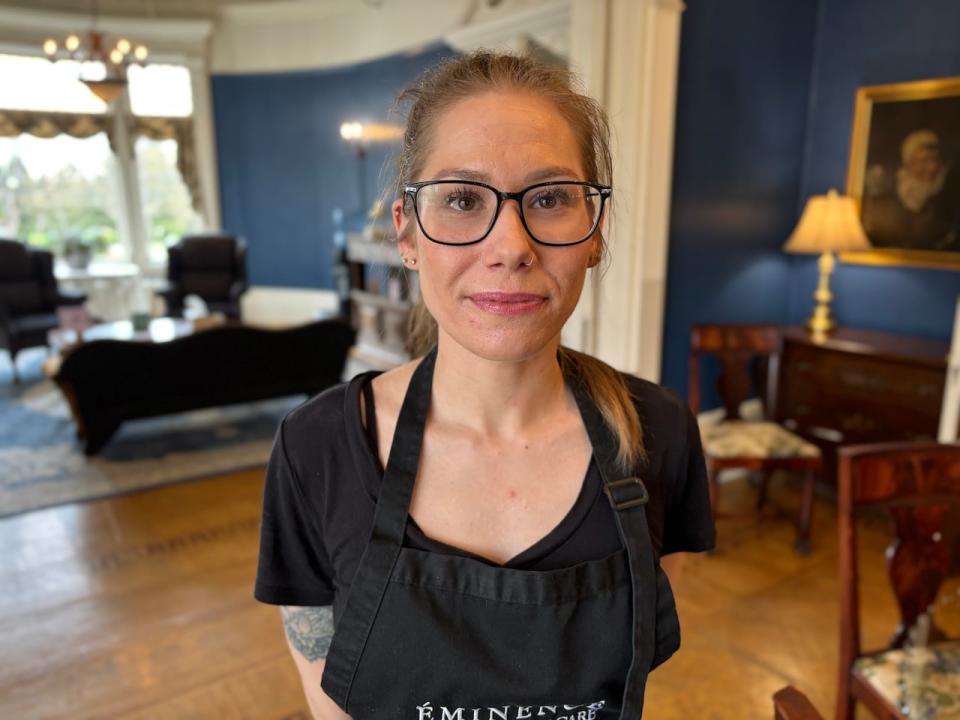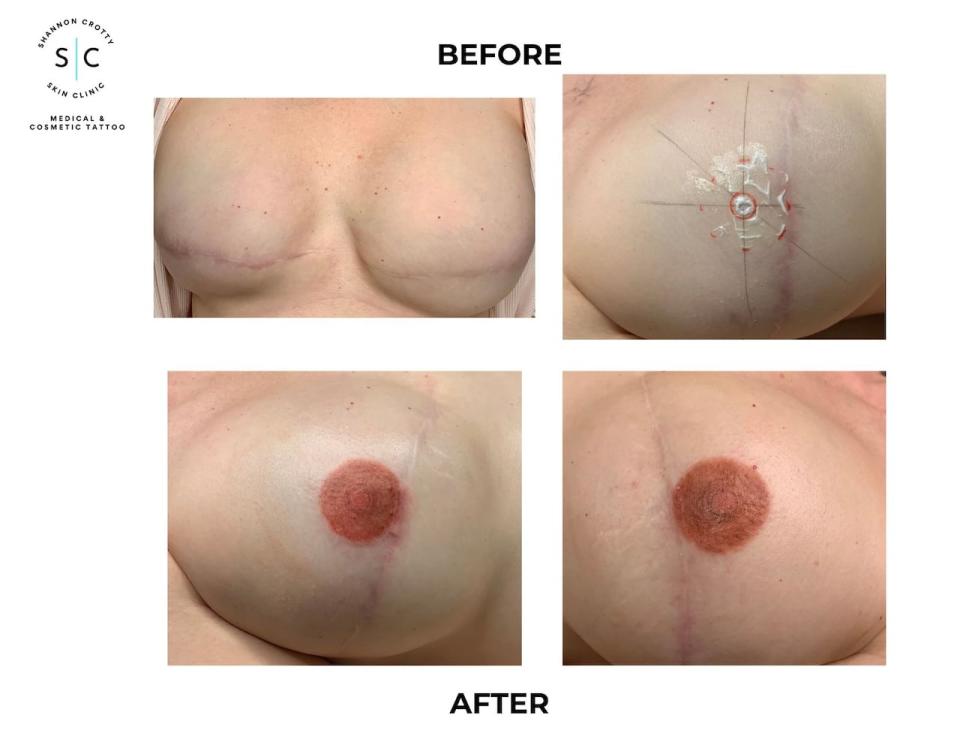This tattoo artist uses ink to mask scars and reconstruct skin


Jessica Burke got her eyebrows, eyeliner and lip blushing tattooed. She also got microneedling to minimize the appearance of acne scars. She says the procedures help her feel more comfortable in her own skin. (Darrell Roberts/CBC)
Jessica Burke remembers when she started wearing makeup.
She was nervous, standing in line for photos at a new school, chatting with another girl.
"She's like, 'Are you getting your photo done like that?'" Burke recalled.
The other girl did her makeup for her — and Burke said she immediately started getting compliments.
As a young person, Burke struggled with cystic acne on her face. Cystic acne is an inflammatory form of acne that causes painful, pus-filled pimples deep under the skin.
Burke said it was like a breakout that never went away. Sometimes, the acne was so severe that she would avoid going out or seeing friends.
"I would lie and say that I was sick, not feeling well, just so I wouldn't have to put my face out there," she said
She wore makeup every day, for years, at first to cover the acne itself and then later to hide the scarring.
"Putting on my makeup every day was literally putting on a mask. I was hiding myself, every day," she said.
In her 30s, Burke decided it was time to make some of that makeup permanent, and she got her eyebrows and eyeliner tattooed.
WATCH | When tattoos are meant to go unnoticed:
She also got microneedling to minimize the appearance of the scarring.
Cosmetic procedures can still carry stigma, but for Burke, the procedure was about feeling comfortable in her own skin.
Burke said she still wears makeup — but now it's because she wants to, rather than feeling like she has to.
"Now I actually feel like I'm not putting on a mask every day," she said.
From stunts to tattoos
Shannon Crotty, a paramedical tattoo artist and esthetician in St. John's, performs Burke's microneedling and permanent makeup procedures — part of a range of services that include post-cancer care and gender-affirming care.
Crotty didn't begin paramedical tattooing because she was already a tattoo artist. Her previous career was as a stunt actor in the Newfoundland and Labrador film industry.
When the pandemic hit in 2020, Crotty realized she was ready for a career change — though she still wanted to be creative. Now she does paramedical tattooing and other services out of Winterholme Wellness Centre and Spa in St. John's.
Clients have come to her for help hiding scars from acne, traffic accidents and even self-harm.
She also works with breast cancer survivors who have had mastectomies — both to hide scarring and recreate the appearance of a nipple through tattooing. She uses ink that mimics skin to recreate the 3D look of an areola, calling it an "illusion of protrusion."

Paramedical tattoo artists like Crotty use tattooing techniques to mask scars or recreate features like areolas. (Submitted by Shannon Crotty)
She said there are often tears of joy when clients look in the mirror for the first time after a procedure. For many survivors, Crotty said, it's a "completion step."
"They've quite literally lost a part of themselves, and what I do is help bring that back," she said.
'I felt like I was home'
Non-binary activist Gemma Hickey of St. John's discovered Crotty's service while looking into gender-affirming care. Hickey's surgeon reconstructed their nipples during their top surgery in 2017, but they wanted a more detailed reconstruction.
Hickey said they formed a connection with Crotty during their first meeting, which they felt was important given the intimate nature of the procedure. Hickey had their first session earlier this year, and afterward, they felt euphoric.
"When I looked at myself in the mirror, I just felt really, really good," they said. "I felt like I was home."
Hickey said gender-affirming care — like the procedures Crotty offers — as life-saving.
"Trans rights are being so politicized. It's really important for people like me to know that they have options and they don't have to leave the province," they said.
Crotty said it was the first time she's provided gender-affirming care for a transgender or non-binary client as far as she knows, and she'll continue offering the service along with post-cancer care, scar management and other treatments.
Crotty said clients often have emotional reactions following their procedure, but her work is meaningful for her, too.
"There are so many different things that I've treated and they all bring me equal joy when it's that level of joy that I'm bringing to another person."
Download our free CBC News app to sign up for push alerts for CBC Newfoundland and Labrador. Click here to visit our landing page.


